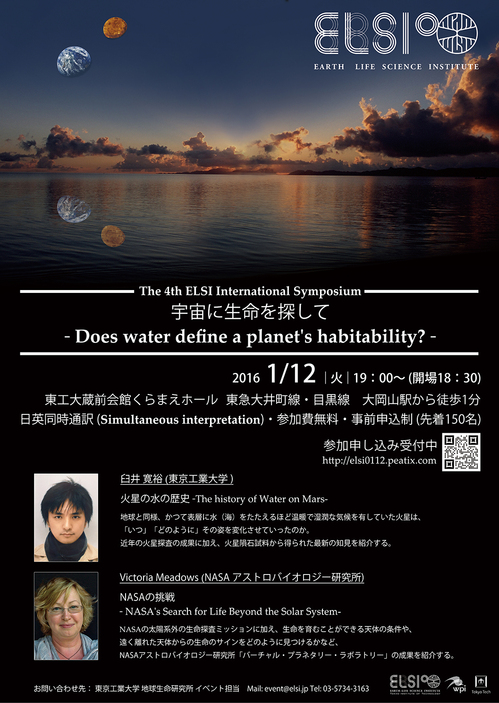Event
The public lecture "Does water define a planet's habitability?" will be held on January 12.
The public lecture "Does water define a planet's habitability?" will be held on January 12.
Tomohiro Usui, Tokyo Institute of Technology, and Victoria Meadows, University of Washington/NASA Astrobiology Institute will talk about planet's habitability.
This event will be held by simultaneous interpretation.
Details
Date: Tuesday, January 12, 2016, 7:00 p.m. - 8:30 p.m. (Doors open at 6:30 p.m.)
Venue: Kuramae Hall, Tokyo Tech Front, Tokyo Institute of Technology, Tokyo, Japan
Fee: Free
Registration: http://elsi0112.peatix.com (Japanese page)
Programme
Lecture1: Tomohiro Usui (Tokyo Institute of Technology)
Title: The history of Water on Mars
Abstract: Recent exploration missions have provided compelling evidence for the presence of liquid water and an Earth-like hydrological cycle with lakes and oceans on Mars. In contrast to this ancient warm environment, today the surface of Mars is cold and dry. The transition to the present cold and dry Mars is closely linked to the history of surface water. In this lecture, I will talk about how scientists have deciphered the history of water on Mars from meteorite studies and exploration missions.
Lecture2: Victoria Meadows (University of Washington/NASA Astrobiology Institute)
Title: NASA's Search for Life Beyond the Solar System
Abstract: One of the grandest and most enduring questions in human history has been whether we are alone in the Universe. While previous generations could only speculate about the possibility of life around other stars, in the coming decades NASA will develop and deploy the telescopes required to begin exploring the environments of distant worlds. But getting these challenging observations alone is not enough - we also need an improved understanding of what we should be looking for, and research that will allow us to interpret what we observe. In this talk Prof. Meadows will give an overview of current and upcoming NASA missions that will study potentially habitable planets and search for signs of life. She will also highlight work being done by the NASA Astrobiology Institute's Virtual Planetary Laboratory to guide this search - including understanding the factors that lead to a planet being able to support life, and how we might recognize signs of alien life on a distant world.













